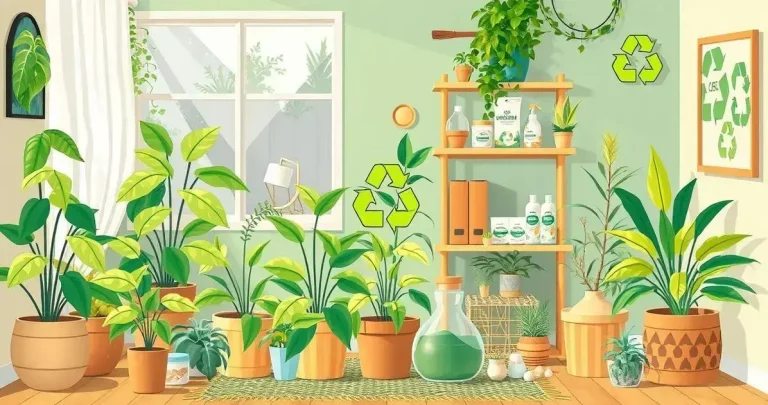Announcements
Eco-Friendly Life Hacks for Sustainable Living are more than just trends—they’re small shifts that can lead to big changes in how we care for our planet. From reducing waste to choosing better products, every decision adds up.
If you’ve been wanting to live more sustainably but feel overwhelmed, you’re not alone. The good news is that living green doesn’t have to be hard or expensive—it just takes a few smart habits and a little creativity.
Curious to discover easy ways to reduce your footprint without sacrificing convenience? Keep reading and find out how simple choices can make a lasting impact.
Announcements
Understanding Eco-Friendly Living
Understanding eco-friendly living starts with making small changes that lead to bigger impacts. Eco-friendly living means making choices that are good for the planet. This includes reducing waste, conserving energy, and using sustainable products in our daily lives.
One easy way to embrace eco-friendly living is by being mindful of how much water and energy we use. Simple actions like turning off lights when leaving a room and taking shorter showers can help. These steps save resources and lower our utility bills, making it a win-win situation.
Announcements
Another important aspect is choosing products that are made from natural or recycled materials. By selecting eco-friendly items, we support businesses that care about the environment. This not only helps reduce pollution but also encourages others to adopt greener practices.
Top 5 Simple Life Hacks
There are simple life hacks you can use to live an eco-friendly life. One great hack is to swap out plastic bags for reusable ones. Not only do these bags help reduce waste, but they also save you money in the long run. Keeping a few in your car or by the door makes it easy to remember them when you shop.
Another easy tip is to start composting kitchen scraps instead of throwing them away. Composting can turn your food waste into nutrient-rich soil for your garden. This not only cuts down on trash, but it also helps your plants grow healthier and stronger.
Lastly, consider setting up a simple recycling station at home. You can label containers for paper, plastic, and glass to make recycling easier for everyone in your household. When recycling becomes a habit, you help conserve resources and reduce waste.
DIY Eco-Friendly Products

Making DIY eco-friendly products at home is a fun way to reduce waste and help the environment. One simple product you can create is a natural all-purpose cleaner using vinegar and water. This easy mixture can clean countertops, glass, and many surfaces without the harsh chemicals found in store-bought cleaners. Just mix equal parts vinegar and water in a spray bottle, and you’re ready to go!
Another great DIY project is creating beeswax wraps. These wraps can replace plastic wrap and are made from cotton fabric and beeswax. Simply melt the beeswax and brush it onto the fabric. Once it’s dry, you can use these wraps to cover leftovers or wrap snacks. They are reusable and can last for a long time.
Lastly, consider making your own soap. You can combine natural ingredients like olive oil, coconut oil, and essential oils to create a gentle soap that is free from harmful chemicals. There are many simple recipes online that guide you through the process. Making soap is not only eco-friendly but also a wonderful way to add a personal touch to gifts.
Sustainable Food Practices
Sustainable food practices are essential for protecting our planet while enjoying delicious meals. One of the simplest ways to support sustainability is by eating locally. When you buy food from local farmers’ markets, you reduce the energy it takes to transport food long distances. Plus, local produce is often fresher and tastes better!
Another great practice is to focus on eating more plant-based meals. Incorporating more fruits, vegetables, grains, and legumes into your diet not only benefits your health but also reduces the demand for animal products. This shift can lower the carbon footprint of your meals and create a more sustainable food system.
Finally, minimizing food waste is a key part of sustainable eating. You can plan your meals better and store food correctly to ensure you’re using what you buy. When you have leftovers, get creative and transform them into new dishes. By being mindful of how much food you waste, you can contribute to a healthier environment.
Eco-Conscious Shopping Choices
Making eco-conscious shopping choices is a powerful way to help the planet. When you shop, look for products with minimal packaging. Items that use cardboard, glass, or compostable materials are often better choices than those wrapped in plastic. This not only reduces waste but also encourages companies to use more sustainable packaging options.
Another way to shop sustainably is to choose products made from natural or recycled materials. For example, when buying clothing, look for brands that use organic cotton or recycled fabrics. This shift helps reduce pollution and conserves resources, making our planet healthier for future generations.
Finally, think about supporting local and ethical brands. When you buy from businesses that prioritize sustainability, you help create a positive impact on your community. Local companies often have a smaller carbon footprint and are more committed to environmentally friendly practices. Choosing to shop this way can make a real difference.
Green Transportation Habits
Adopting greener transportation habits is a smart way to lower your carbon footprint. Walking, biking, or using public transportation instead of driving reduces greenhouse gas emissions and helps keep the air cleaner.
If you need to drive, consider carpooling or investing in a fuel-efficient or electric vehicle. These changes can significantly cut down on pollution while also saving you money on gas over time.
Even combining errands into one trip can make a difference. Every small adjustment adds up to a more sustainable lifestyle when it comes to how we move around each day.
Eco-Friendly Habits at Work
Your workplace can be a great place to implement eco-conscious practices. Start by reducing paper use—go digital when possible and print only when necessary. Reusing office supplies and recycling materials also makes a big difference.
Encourage coworkers to bring reusable water bottles and coffee mugs instead of relying on disposable cups. You can even suggest eco-friendly office policies, like turning off electronics at the end of the day to conserve energy.
When more people join in on these sustainable habits, the ripple effect extends beyond the office. Creating a greener work environment is a step toward a more responsible and mindful community.







